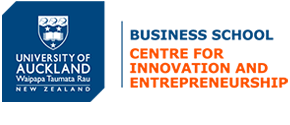

Goal 3: Good Health and Wellbeing
Ensure healthy lives and promote well-being for all at all ages.
 Alimetry – Pioneering health solutions to gastrointestinal diseases
Alimetry – Pioneering health solutions to gastrointestinal diseases
Alimetry is a digital healthcare and diagnostic devices start-up grounded in world-leading science in gastrointestinal diseases. It has established itself as a pioneer in health solutions and was named a finalist in the 2021 NZ Hi-tech Awards. Gastric symptoms are extremely prevalent, affecting around 10% of the global population, and can be painful and debilitating.
The team behind Gastric Alimetry aim to transform the diagnostic pathway for millions of patients worldwide suffering from diseases such as functional dyspepsia, gastroparesis and chronic nausea and vomiting. Alimetry is the culmination of over a decade of award-winning scientific research out of the University of Auckland. Research has been supported by the start-up experience of its founding team, who are serial entrepreneurs. Both CEO Greg O’Grady and Chief Scientific Officer Peng Du gained experience in innovation and entrepreneurship through participating in Velocity. Read more
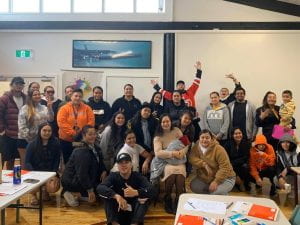 Clearhead and Mā Te Huruhuru – Empowering Māori rangatahi to check in on their mental health and wellbeing
Clearhead and Mā Te Huruhuru – Empowering Māori rangatahi to check in on their mental health and wellbeing
Online mental wellbeing platform Clearhead collaborated with youth organisation Mā Te Huruhuru to bring together 40 Māori rangatahi (youth) in South Auckland to learn more about navigating mental health and how to improve their mental wellbeing with Clearhead’s digital tools. The programme also taught participants more about their Māori culture and identity as a protective factor towards a larger goal of suicide prevention.
The partnership between Clearhead and Mā Te Huruhuru was formed when Mahera Maihi, founder of Mā Te Huruhuru, was thinking about how she could prevent the cycle of intergenerational disadvantages, and poor mental health outcomes that she was seeing within her community. She connected with Angela who agreed that there was a natural synergy between the youth group’s work and the start-up’s mission to ensure that personalised mental health support is culturally responsive and accessible to everyone. Read more
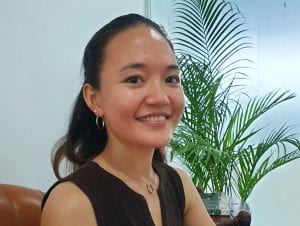 Developing business capability in the Pacific Island
Developing business capability in the Pacific Island
Market Development Facility (MDF) is a multi-country initiative which promotes sustainable economic development in partner countries. University of Auckland alumna Carline Bentley is supporting the organisation’s mission through her role as a Business Advisor in Fiji for MDF’s High Value Agriculture team.
Fiji’s main commodities in agriculture for foreign markets include kava, dalo, turmeric, and ginger. Value adding, resulting in premium products, has been identified as an immense opportunity for Fijian farmers and businesses. Bentley says “We collaborate with businesses to improve farmers’ access to quality agricultural inputs and markets, with a goal of increasing their yield and income and improving their livelihoods.” Read more
 Dr Francis Hunter – Understanding entrepreneurship as an enabler in the search for cures to cancer
Dr Francis Hunter – Understanding entrepreneurship as an enabler in the search for cures to cancer
Since graduating from the University of Auckland, Dr Francis Hunter has forged a career dedicated to finding enlightenment to some of the darkest diseases known to humankind. He now works in Pennsylvania in therapeutic discovery and development.
During his New Zealand career, Francis became the first New Zealand scientist to be selected for a three-year term on the Associate Member Council of the American Association for Cancer Research (AACR) – the largest organisation for cancer research in the world.
He now works in the United States which has the world’s most innovative and productive pharmaceutical sector. Francis says that the resources available are able to better his ability to make an impact at scale. “Having access to the resources and infrastructure of a Fortune 500 company (Johnson and Johnson, in my case) has enabled me to pursue solutions for cancer patients that would never have been possible within New Zealand. For example, to find a chemistry ‘starting point’ for a recent drug discovery programme, we were able to test 15 billion different chemical structures.” Read more
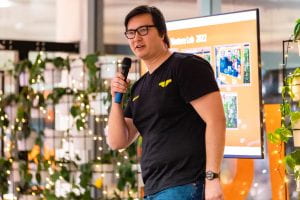 Fistbump – virtual solution developed to enable real life friendships
Fistbump – virtual solution developed to enable real life friendships
In early 2021 a group of students noticed the magnitude of complaints around the social situation amongst their university peers and instigated friend making app Fistbump. Co-founder Michael Shaimerden says “The process of creating Fistbump to facilitate friendships has revealed an even bigger problem – the scale of social anxiety that young New Zealanders are experiencing. A lot of people say that young people should just get out there and talk to each other in person, but people genuinely don’t know how to do that. There’s an opportunity here to take online tools that have become a problem and utilise them to create solutions to help people’s mental wellbeing.” Read more
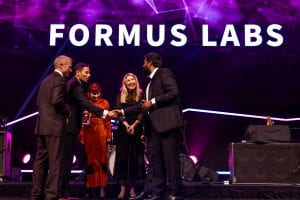 Formus Labs – World-first AI-powered orthopaedic surgery software start-up wins big at the 2023 Hi-Tech Awards
Formus Labs – World-first AI-powered orthopaedic surgery software start-up wins big at the 2023 Hi-Tech Awards
Double honours are flowing for Formus Labs as the start-up led by Thor Bessier, an alumnus of the University of Auckland Business School’s Centre for Innovation and Entrepreneurship (CIE), snatched two prestigious titles at the 2023 NZ Hi-Tech Awards.
Formus Labs has been recognised twice over for its outstanding innovation, contribution, and success as winner of the Duncan Cotterill Most Innovative Hi-Tech Software Solution and winner of the Soul Machines Most Innovative Deep Tech Solution.
The company, co-founded in 2016 by Waipapa Taumata Rau, University of Auckland Professor Thor Besier and alumnus and bioengineer Dr Ju Zhang, developed the world’s first AI-powered orthopaedic surgery software. Read more
 Global Bio Fund – Supporting entrepreneurs addressing global challenges in healthcare
Global Bio Fund – Supporting entrepreneurs addressing global challenges in healthcare
University of Auckland alumna Ipshita Mandal-Johnson is the CEO of the Global Bio Fund (GBF), an impact fund with a world-leading approach to growing diverse entrepreneurs (especially women-led companies). GBF is building the world’s first seed accelerator fund focused on the best diverse entrepreneurial teams addressing global challenges in healthcare, food security and climate change.
It operates to serve a number of functions – building research and learning experiences through an open network of thought leaders and entrepreneurs, sharing knowledge through consulting and advisory services to raise capital or scale businesses, and directly investing through two vehicles: the Global Bio Xcellerator and the Global Bio Fund. Read more
GreenSpot Technologies – turning food waste into high-nutrition flour
Greenspot Technologies, a start-up that came to life through the Centre for Innovation and Entrepreneurship’s Velocity programme, has created a range of flour made from fermented fruit and vegetable pulp. Greenspot Technologies’ range includes pinot noir, sauvignon blanc, apple, beetroot, orange, carrot and parsnip flours. Their flours are high in protein and fiber and low in sugar and fat. They are made using a sophisticated fermentation process first developed in the research labs of the University of Auckland. Since going through the Velocity programme, Greenspot Technologies has received substantial investment and has made the move to France and have won multiple international awards for innovation.
Could this zero waste, gluten-free, vegan, low-carb NZ pinot noir flour be the next superfood?
Ninna’s story
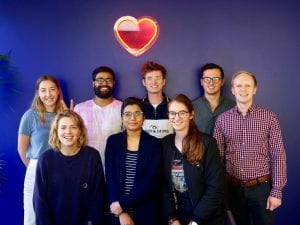 HeartLab – Using AI to innovate the future of cardiology
HeartLab – Using AI to innovate the future of cardiology
HeartLab, a venture founded by University of Auckland Science alumnus Will Hewitt, is building the world’s first end-to-end solution for echocardiography, a medical test that uses sound waves to produce live images of patients’ hearts. Echocardiography is a doctor’s ‘go-to’ scan if they know or suspect that a patient has some form of heart disease.
Given that tests are carried out so frequently, Will saw an opportunity to use AI to enhance the entire workflow. Rather than having cardiologists manually annotate each video scan, HeartLab’s technology highlights the most important milliseconds so they can spend less time sitting at the computer and more time with their patients. In 2020, HeartLab raised $1.1 million in their first round of seed funding in an investment round led by Icehouse Ventures and supported by US-based VC firm Founders Fund. Read more
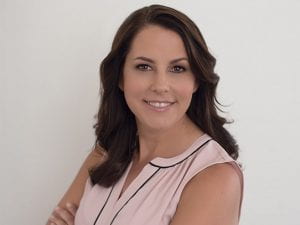 Junofem – Women’s health start-up developing innovative solution to global problem
Junofem – Women’s health start-up developing innovative solution to global problem
A device created by biotech company Junofem is providing a solution to help women address a common health problem with dignity and precision.
Junofem has created the femfitⓇ, a pelvic floor trainer that is a medical device designed by clinicians to meet the needs of women suffering from urinary incontinence. It is different from other gadgets on the market, offering real-time biofeedback which shows users their pelvic floor and abdominal muscle allowing them to learn effective techniques. It is slim and flexible and can be worn comfortably during exercise, and the exercise programme integrated into the app is clinically validated. The femfitⓇ is also a tool for healthcare professionals allowing them to functionally assess how the entire muscle bed is functioning in different positions and they will have access to a clinical portal to allow them to remotely monitor patients and provide individual advice based on their progress.
The femfitⓇ is based on research from the Pelvic Floor Group at the University of Auckland. When it came time to commercialise the idea to make it an accessible solution for the general public, the group approached Jen Barnes to take the role of CEO. Jen is a trained scientist with 15 years of commercial experience and was known to the team from her time working at UniServices, the University of Auckland’s commercialisation company.
Jen was always a scientist but she wasn’t always an entrepreneur. While working at UniServices, Jen took part in the Velocity entrepreneurship competition run by the Business School’s Centre for Innovation and Entrepreneurship, becoming a finalist for her team’s diagnostics venture SpotCheck. Jen says “The Velocity programme was the first time I reframed the way I looked at myself and considered myself an entrepreneur. I have never considered myself a creative person and I believe entrepreneurs are generally very creative. Velocity helped me realise we all have different sides and strengths and there is no rule about creating a business. You just have a vision backed by sound decisions, and the fortitude to build that vision.” The skills she has gained have helped Jen lead the team at JunoFem to achieve an astonishing array of achievements, delivered at pace. Read more
 Kara Technologies – Signing up for accessibility
Kara Technologies – Signing up for accessibility
Kara Technologies is a start-up, co-founded by University of Auckland alumni Arash Tayebi, using digital sign language avatars to make communications of all kinds accessible to the Deaf community. They envision a future where around the world, TV shows, bank machines, travel websites, online registration forms, live theatre, social media, gaming, and virtual reality technologies are all equipped with sign language avatars.
Kara has already produced a diverse suite of avatars, signed children’s books and a range of videos such as a recent one explaining Anzac Day. It has been recognised many times for its innovative work, from being the social enterprise winner of the Velocity $100K Challenge in 2017 to being named a 2022 finalist in the NZ Hi-Tech Awards, in the Best Hi-Tech Solution for the Public Good category. Read more
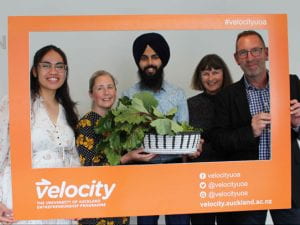 Maara Fresh – Feeding hearts, minds and stomachs
Maara Fresh – Feeding hearts, minds and stomachs
An innovative business idea developed by Manurewa’s home-grown entrepreneurs will benefit more than 2,000 Manurewa High School students through Ka Ora, Ka Ako, the Government’s healthy school lunches programme, starting in 2021. Maara Fresh is a social enterprise that literally grew out of the Manurewa Community Garden.
Developed with the support of the University of Auckland Business School’s Centre for Innovation and Entrepreneurship (CIE) it provides a structure to ensure the financial sustainability of initiatives run out of the gardens. These include growing fresh produce to supply to local families, community kitchens and food banks in Manurewa and an education programme about horticulture for students to ensure sustainability. Read more
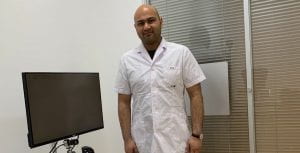 Objective Acuity – Breakthrough technology advancing eye care for children
Objective Acuity – Breakthrough technology advancing eye care for children
Objective Acuity is creating an accessible and accurate way of detecting vision problems early in life by developing the first objective vision screening test based on visual acuity for children under the age of five. The venture was founded by Dr Ben Thompson, a Professor of Optometry and Vision Science at the University of Auckland, Dr Jason Turuwhenua and Dr Mehrdad Sangi at the University of Auckland’s Auckland Bioengineering Institute (ABI).
Objective Acuity has meaningful potential to help identify vision problems in children as early as possible. Undetected problems can reduce school achievement, harm the development of hand-eye coordination, and lead to a lifelong reduction in vision. Objective Acuity was one of four innovative Kiwi businesses that received a share of $625k from Spark’s 5G Starter Fund, a fund dedicated to businesses that have showcased how 5G could deliver positive outcomes to communities across the country. Read more
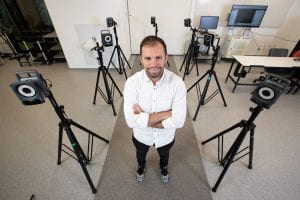 OPUM Technologies – The Digital Knee®
OPUM Technologies – The Digital Knee®
OPUM Technologies Limited optimises care pathways for musculoskeletal conditions, delivering remote patient monitoring to patients with knee conditions through their Digital Knee®. Their offering incorporates both product and service, with wearable technology and virtual therapy from clinical staff who support patients through their care journey.
OPUM CEO, inventor and Associate Professor in Mechanical Engineering Dr Andrew McDaid says “We manage peoples knee health by collecting previously unattainable real-time data and using AI to glean insights that drive improved decision making by healthcare providers and insurers. This ensures the best care is delivered in a timely and cost-effective manner.” Read more
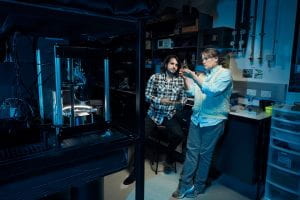 Orbis Diagnostics – The 15-minute Covid immunity test
Orbis Diagnostics – The 15-minute Covid immunity test
Orbis Diagnostics, founded by University of Auckland Faculty of Science professors David Williams and Cather Simpson, is on a mission to re-enable movement during a pandemic by making complex medical testing accessible wherever and whenever it is needed. They have developed an accurate, cost-effective quantitative immunity test for Covid-19 capable of verifying a person’s health status and assess whether vaccines have been effective in as little as 15 minutes. They can process up to 15 samples simultaneously and provide laboratory-grade results at any point of need, such as airports and cruise ship terminals, supporting the safe resumption of international travel.
David also sees potential in other applications for their technology. He says, “It’s a very powerful general method for enabling laboratory instrument-type accuracy of complex measurements of biochemical markers away from the central lab – in local clinics for example. Read more
 Pacific Med Tech – Answering Pacific healthcare professionals calls for help
Pacific Med Tech – Answering Pacific healthcare professionals calls for help
Pacific Med Tech is a social venture that aims to support capacity building in biomedical engineering departments of hospitals in the Pacific. It was established in March 2020 after founders Janette Searle and Larissa Michelsen returned from a trip to the Pacific where they saw talented and dedicated medical professionals struggling to meet patient needs due to broken equipment.
Pacific Med Tech empowers hospital and health clinic staff to be able to fix broken equipment by supplying practical troubleshooting guides and other technical education opportunities. Pacific Med Tech started while Larissa was completing her Master of Engineering Studies, which meant they had the opportunity to enter into the Velocity $100k Challenge, delivered by the Centre for Innovation and Entrepreneurship. Read more
 SpinPoi – Poi therapy venture spins around the world
SpinPoi – Poi therapy venture spins around the world
After falling in love with poi while in the circus, Dr Kate Riegle van West packed up her life in the United States and headed to New Zealand to chase a hunch that playing with poi had health benefits. Conducting the world’s first scientific study of poi and wellbeing as a PhD at the University of Auckland, under the supervision of the Centre for Brain Research and the School of Dance Studies, her clinical study proved benefits in grip strength, balance, and the ability to sustain attention for healthy older adults after just one month of practice.
In 2019 Kate was the overall runner up of the Velocity 100k Challenge, a competition part of the University’s entrepreneurship development programme delivered through the Business School’s Centre for Innovation and Entrepreneurship (CIE). With the support of CIE’s mentors, Kate developed a business case for SpinPoi, a social venture dedicated to working with poi to improve health and wellbeing. Read more
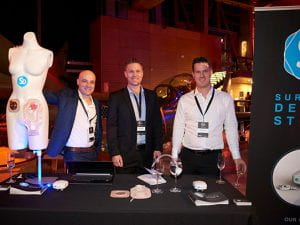 Surgical Design Studios – Taking bowel disease technology to the world
Surgical Design Studios – Taking bowel disease technology to the world
Surgical Design Studios (SDS) has developed a range of medical devices that reduce the time it takes until patients can use their guts again following bowel surgery from five months to two weeks. The technology developed is truly revolutionary and has attracted $4.3 million through early-stage capital raising. SDS raised the money through its first angel fundraising round led by Icehouse Ventures fund Tuhua II. The company will use the funds raised to bring its devices to market, with plans to launch in New Zealand later this year, and then overseas once it gains regulatory clearances.
SDS was founded two years ago at the University of Auckland’s Medical School department of surgery. Trials at Auckland City Hospital showed extremely promising results. Co-founder and Chief Scientific Officer Greg O’Grady is an alumnus of the Centre for Innovation and Entrepreneurship’s Velocity programme, and continues to work as an Associate Professor at the University of Auckland’s Faculty of Medical and Health Sciences. Read more
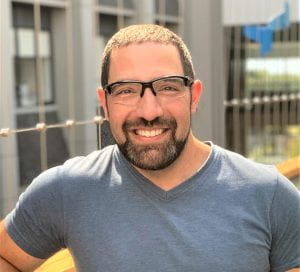 Toku eyes – Scanning eyes to predict illnesses
Toku eyes – Scanning eyes to predict illnesses
Toku Eyes is an AI technology, founded by university of Auckland scientist and lecturer Ehsan Vaghefi, that scans eyes to predict the likelihood of blindness, stroke or heart disease. What sounds like science fiction is now science fact, currently operating in over 70 clinics worldwide. Having recently completed a $3.6 million investment round, the venture is now looking to expand operations from New Zealand, Australia and India into the United States. Read more
 Ūkaipō – Biodegradable Rau Whenua placenta planting packages
Ūkaipō – Biodegradable Rau Whenua placenta planting packages
There are few moments more precious than when a family brings new life into the world. Business student Te Miringa Parkes’ venture Ūkaipō aims to help families celebrate the occasion through its leak-proof, biodegradable Rau Whenua placenta planting packages. Planting the placenta underneath a tree sapling following birth is a custom in many cultures, including Māori.
The construction of the Rau Whenua basket, of a particular cardboard with an inner membrane that breaks down, means that it is both home-compostable and freezer safe (as planting often happens a few months after birth). The package also contains kowhai or pohutukawa seeds, an information brochure with a guide to the placenta burying process and a Muka pito tie (a natural alternative to plastic umbilical clamps). Te Miringa entered the Velocity $100k Challenge in 2020 and placed second. Read more
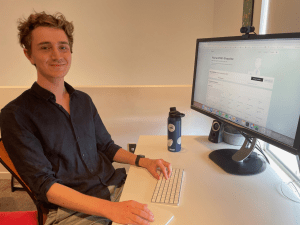 Vaxx.nz – Helping Kiwis get their Covid vaccines
Vaxx.nz – Helping Kiwis get their Covid vaccines
Vaxx.nz is a tool created by nine University of Auckland and AUT alumni that helps people locate an available vaccination centre near them quickly and easily, with the aim of helping New Zealand reach its 90% vaccination target as soon as possible. On the website, users simply specify their location and the maximum distance they wish to travel, and they will be shown all of the earliest available vaccination slots that fit their search parameters in a clean, easy to digest format. After selecting their desired slot, users are taken to the official government website to complete their booking.
The team also released a widget that can be compactly integrated into any website such as news outlets and Microsoft Teams. The design was built around visual clarity and ease of use and supports nearly 20 languages. Thinking about the future, the team hopes to be able to apply their technology to other issues faced in New Zealand and around the globe. Read more
Anima Self – The venture creating a playground for you to think, feel, and grow
Last year, Tiger Chen, an alumna of the University of Auckland Business School’s Centre for Innovation and Entrepreneurship (CIE), made a bold move to London to explore Europe and seek career opportunities as a newly-trained UX designer. To her surprise, the move led her to join AnimaSelf, an innovative mental health start-up app, where she now works as the lead product designer as a side hustle while also working a day job as a UX designer for a software company.
AnimaSelf offers a unique and personalised experience for its users, from the customisable Anima avatar to the daily support provided. What sets it apart from other wellness apps is its emphasis on early detection and intervention. Most wellness apps on the market are geared towards individuals who are already struggling with mental health, while AnimaSelf takes a proactive approach, helping people to navigate the challenges of day-to-day life. Read more
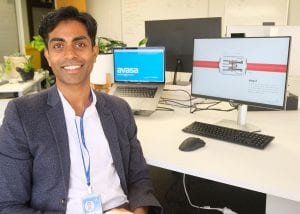 Avasa – Making microvascular surgery quicker and safer
Avasa – Making microvascular surgery quicker and safer
Imagine if you had to hand-sew one piece of garden hose to another to connect them. Now imagine you have a few to do, and if you don’t do them quickly and correctly, your lawn could die. Oh, and make the hoses 1.5 to 4mm in diameter. It may sound ridiculous, but this the sort of thing surgeons do in reconstructive surgeries, which can take as long as 16 hours.
As a plastic surgery resident, Dr Nandoun Abeysekera took part in many microvascular surgeries. There was a coupler to connect veins – a device comparable to the ring you use on garden hoses. However, there was nothing for arteries. Abeysekera figured there had to be a way to create a coupler that would work on arteries and thus make microvascular surgery quicker and safer. Read more
 Roster Lab – Isaac Cleland goes from academia to entrepreneurship with his AI rostering venture
Roster Lab – Isaac Cleland goes from academia to entrepreneurship with his AI rostering venture
The AI rostering software solution, RosterLab, won the University of Auckland’s Velocity $100K Challenge in 2020 after Engineering PhD student Isaac Cleland made a last-minute entry to the entrepreneurship competition. RosterLab is based on his research with Associate Professor Andrew Mason and Dr Michael O’Sullivan into developing new techniques for mathematically optimising large and complex roster models.
Following its victory in the competition, RosterLab was adopted by healthcare providers throughout New Zealand and is now expanding to other industries that can also benefit from their innovative rostering solution, recently announcing a partnership with the SeaLink ferry service. Read more
 Bodymapp app innovation enables accurate body scanning
Bodymapp app innovation enables accurate body scanning
Bodymapp is a venture that allows users to track and visualise changes to their bodies. Its cutting-edge app enables iphones to scan and generate 3D avatars which accurately reflect the users body shape. Particularly popular among people pursuing health and fitness goals, Bodymapp’s technology can be used by anyone who wants to know more about their body, or visually track changes. Pregnant woman, for example, can use the app to monitor changes to their bodies, and people who prefer online shopping can use the app to obtain precise body measurements easily at any given time.
The app also provides users with a range of essential health metrics, including body fat estimates, waist-to-hip and waist-to-height ratios, and other indicators of overall health. Bodymapp generates a comprehensive health report which offers broad recommendations on nutrition and exercise, tailored specifically to the user’s body shape. Read more
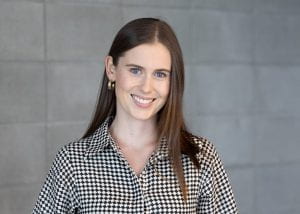 Moodi – New Zealand women’s mental wellness venture prized in Nashville
Moodi – New Zealand women’s mental wellness venture prized in Nashville
While studying for her Law and Commerce degrees at the University of Auckland, entrepreneur Kate Gatfield-Jeffries co-founded Moodi, a mental wellness brand for women. Kate was part of the Velocity $100k Challenge and worked with the Aotearoa Centre for Enterprising Women. Recently she was selected to be part of an Accelerator Programme for 26 young women entrepreneurs and was the only founder outside the US to participate. As part of this, she pitched Moodi to a panel of judges at the Women in Business Conference in Nashville and placed second in the competition, winning a $10,000 prize. Read more
AviadoBio – Gene therapy venture makes progress on the path to treating dementia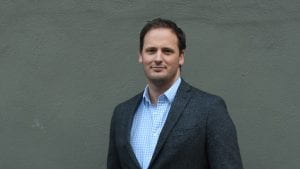
AviadoBio looks set to initiate their first human clinical trial this year for gene therapy they are developing to treat early-onset dementia.
The particular gene therapy moving into clinical trial has been designed to treat a genetic form of early-onset dementia called Fronto-temporal Dementia. It is just one of the medicines being developed by AviadoBio to treat neurogenerative diseases. They are also exploring treatments for Amyotrophic lateral sclerosis (ALS), also known as motor neuron disease (MND) or Lou Gehrig’s disease. Read more
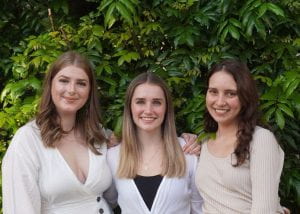 Let’s talk consent – Students take consent education to Milan
Let’s talk consent – Students take consent education to Milan
With rape and sexual violence regularly in New Zealand news headlines, the value of consent education cannot be underestimated, say the founders of Let’s Talk Consent.
University of Auckland students Jasmine Gray, Laura Porteous, and recent graduate Genna Hawkins-Boulton travel to Milan this month to share their mahi around consent education and compete in the inaugural Sustainability Impact Forum, hosted by the United Nations Sustainable Development Solutions Network. Read more
Dr Simon Malpas – The urgent need for innovation investment in New Zealand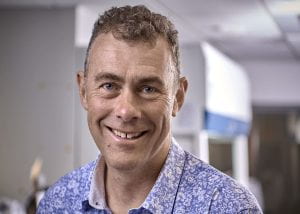
Dr Simon Malpas, the CEO and founder of Kitea Health and Professor of Physiology and Bioengineering at Waipapa Taumata Rau, the University of Auckland, recently shared his insights on raising capital and emphasised the importance of investing in innovation for New Zealand’s economic growth and resilience.
Dr Malpas’ entrepreneurial journey began in 2003 and 2004 when he participated in the Velocity entrepreneurship development programme delivered through the Business School’s Centre for Innovation and Entrepreneurship (CIE). A serial entrepreneur, he is currently focused on his latest venture, Kitea Health Ltd, which has created a ground-breaking implantable pressure-sensing device. This device has the potential to improve the lives of millions of patients worldwide who suffer from hydrocephalus or chronic heart conditions. Read more
 Duncan Cunninghame – Taking New Zealand MedTech global
Duncan Cunninghame – Taking New Zealand MedTech global
Navigating different markets with different healthcare systems can be challenging. Duncan Cunninghame, Vice President of Business Development at The Insides Company, is helping to chart the course in the complex European market and is driven by an entrepreneurial mindset to deliver health impact at scale.
The Insides Company is an innovative medical technology company founded in Aotearoa, New Zealand, aiming to revolutionise the treatment of patients living with intestinal failure. It has been actively growing its worldwide distribution networks so that as many patients as possible across the globe can access their life-changing medical devices. Its’ expansion has been supported by nearly $10 million in capital raised and industry confidence. Read more
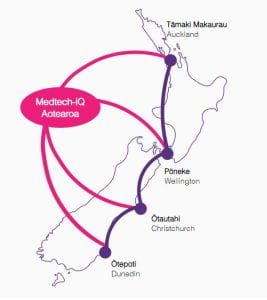 World-first collaboration Medtech-iQ off to a healthy start
World-first collaboration Medtech-iQ off to a healthy start
Medtech-iQ Aotearoa is a national collaboration of innovation with the purpose of accelerating the success of the New Zealand MedTech sector. It is a virtual national innovation hub that is linked to a backbone of four physical regional hubs in Tamaki Makaurau Auckland, Poneke Wellington, Otautahi Christchurch and Otepoti Dunedin.
According to a recent Deloitte report, Medtech-iQ Aotearoa is a “world-first” initiative that aims to capitalise on the global medical device and digital health market estimated to have a value of US$815 billion. A strategic, coordinated approach helps leverage a significant opportunity for New Zealand, which will have a positive impact on the economic and physical health outcomes of all New Zealanders. Read more
 Newmarket Innovation Precinct – Old brewery now a powerhouse of industry, innovation and entrepreneurship
Newmarket Innovation Precinct – Old brewery now a powerhouse of industry, innovation and entrepreneurship
Formerly home to the iconic Lion Brewery, Waipapa Taumata Rau | University of Auckland purchased the 5.2-hectare Khyber Pass property in May 2013. Just over ten years later, many people are curious about what is happening inside the expansive facilities. Known as the Newmarket Campus, the area encompasses a wonderland of facilities, equipment and research capabilities to support the Faculties of Engineering and Science. The site also hosts the New Zealand Product Accelerator and is home to the University’s Newmarket Innovation Precinct (NIP), a multidisciplinary industry-facing research and development community.
The Newmarket Campus is adjacent to the Grafton Campus, Auckland Hospital, Mercy Hospital, and local high schools, as well as a thriving retail district and excellent accessibility by public transport and community services. Its central location adds to the opportunities for effective collaboration both within the University and with the wider community. Read more
EMAIL
CIE@AUCKLAND.AC.NZ
POSTAL ADDRESS
THE UNIVERSITY OF AUCKLAND BUSINESS SCHOOL
PRIVATE BAG 92019, AUCKLAND














